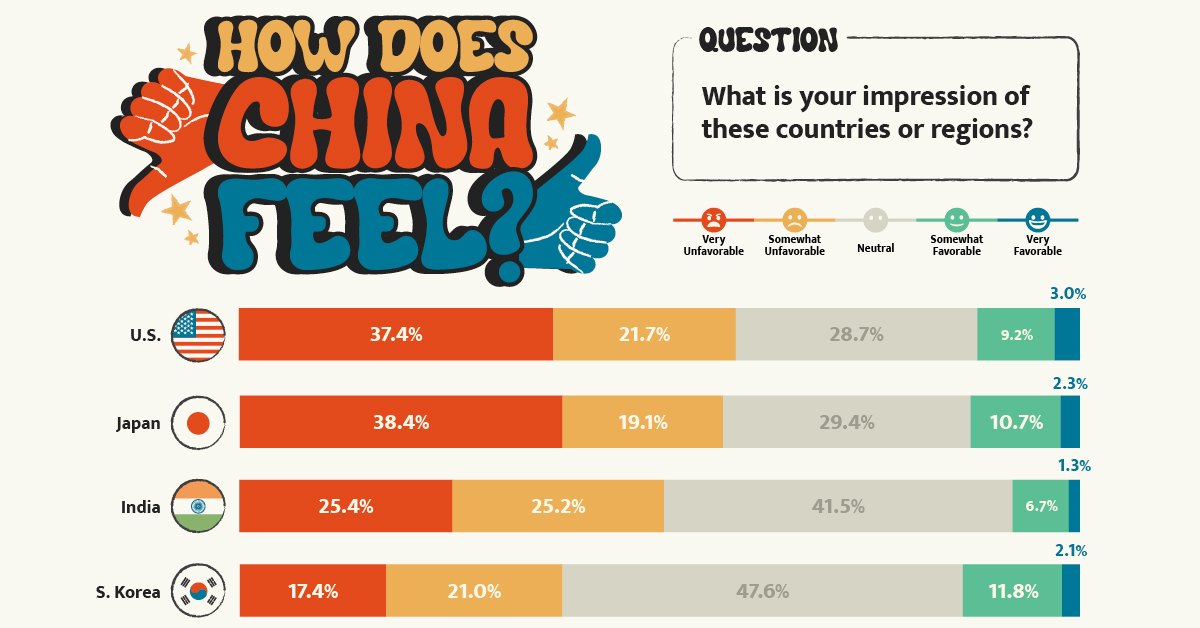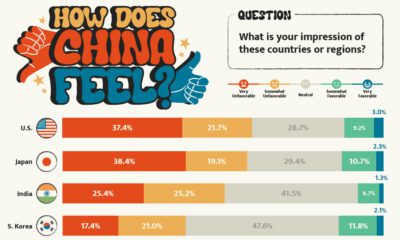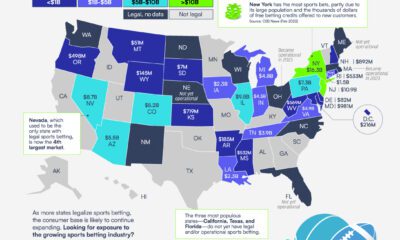Misc
America’s Multi-Billion Dollar Sports Betting Industry
In 2015, Americans bet $149 billion illegally on sporting events.
Today’s infographic from Longitude breaks down America’s multi-billion dollar sports betting industry. It shows the four states where fixed odds betting through bookmakers is legal, and it also compares a more legal alternative that’s available in 43 states.

The Sports Betting Industry
Sports betting is a thriving underground business. A recent example of this is Super Bowl 50, which is estimated to have fetched a record-breaking $4.1 billion in illegal bets. Only an additional $100 million of bets, or 3% of the total, were made legally.
But what’s the difference between a legal bet, and an underground one? It all depends on where you live and how the betting is done.
Fixed-odds betting, in which odds are created by a bookmaker, is legal in just four states: Montana, Oregon, Delaware, and of course Nevada.
Pari-mutuel wagering, which instead pools players bets together to calculate odds, is legal in 43 states. Pari-mutuel payout odds depend on the amount of bets, and generate transparent profits because of fixed commission fees paid to the operator.
The US horse racing industry already uses pari-mutuel wagering, and it generates a range of economic benefits. This includes $102 billion in economic benefits generated annually and the support of 1.2 million jobs across the country.
Misc
How Do Chinese Citizens Feel About Other Countries?
What is the Chinese public’s view of world powers? This visual breaks down Chinese sentiment towards other countries.

Public Opinion: How Chinese Citizens Feel About Other Countries
Tensions over Taiwan, the COVID-19 pandemic, trade, and the war in Ukraine have impacted Chinese sentiment towards other countries.
This visualization uses data from the Center for International Security and Strategy (CISS) at Tsinghua University to rank survey responses from the Chinese public on their attitudes towards countries and regions around the world.
Chinese Sentiment Towards Other Countries in 2023
In the Center’s opinion polls, which surveyed a random sample of more than 2,500 Chinese mainland adults in November 2022, Russia came out significantly ahead.
Just under 60% of respondents held Russia in a favorable view, with 19% seeing the country as “very favorable.” Contrast that to the mere 12% that viewed the U.S. in a positive light.
Here’s a closer look at the data. The percentages refer to the share of respondents that voted for said category.
| Country/Region | Very Unfavorable | Somewhat Unfavorable | Neutral | Somewhat Favorable | Very Favorable |
|---|---|---|---|---|---|
| 🇺🇸 United States | 37.4% | 21.7% | 28.7% | 9.2% | 3.0% |
| 🇯🇵 Japan | 38.4% | 19.1% | 29.4% | 10.7% | 2.3% |
| 🇮🇳 India | 25.4% | 25.2% | 41.5% | 6.7% | 1.3% |
| 🇰🇷 South Korea | 17.4% | 21.0% | 47.6% | 11.8% | 2.1% |
| 🇪🇺 European Union | 9.3% | 15.6% | 57.6% | 14.1% | 3.3% |
| Southeast Asia | 7.1% | 13.1% | 59.5% | 16.8% | 3.5% |
| 🇷🇺 Russia | 3.0% | 4.8% | 33.7% | 39.4% | 19.0% |
Japan ranked just below the U.S. in terms of overall unfavorability, though a slightly higher share of respondents saw Japan as “very unfavorable” compared to America. This is likely due to both modern tensions in the East China Sea over mutually claimed islands and historical tensions over the Sino-Japanese Wars.
Chinese sentiment towards India was also unfavorable at just over 50%, though notably the country also received the lowest favorability rating at just 8%.
Additional Survey Findings
The survey also found that 39% of Chinese people get their information on international security from Chinese state-run media (mainly through TV), with an additional 19% getting information from government websites and official social accounts. Conversely, only 1.7% get their news from foreign websites and foreign social media, partially due to the Great Firewall.
When asked about different international security issues, the biggest shares of Chinese citizens ranked the following as their top three:
- Pandemics (12.9%)
- Disputes over territory and territorial waters (12.9%)
- China-U.S. relations (12.0%)
The pandemic’s high score reflects the harsher impact COVID-19 had on China. Chinese borders were shut for years and the public faced intense measures to reduce spread.
In terms of other world events, the majority of Chinese people align with a more “Eastern” viewpoint. For example, in regards to the war in Ukraine, the report found that:
“About 80 percent of the respondents believe the U.S. and Western countries should be held most accountable [for the war], while less than ten percent of the respondents argue that Russia is mainly responsible.”– Center for International Security and Strategy, Tsinghua University
Overall, the views of the Chinese public reflect the opposite of those found in many Western countries. They provide an important insight that it is not just the Chinese government holding particular views about the world, but the Chinese public as well.
-

 Investor Education4 weeks ago
Investor Education4 weeks agoVisualizing BlackRock’s Top Equity Holdings
-

 Technology2 weeks ago
Technology2 weeks agoMeet the Competing Apps Battling for Twitter’s Market Share
-

 Misc18 hours ago
Misc18 hours agoHow Do Chinese Citizens Feel About Other Countries?
-

 Markets4 weeks ago
Markets4 weeks agoVisualizing Every Company on the S&P 500 Index
-

 Markets2 weeks ago
Markets2 weeks agoVisualizing 1 Billion Square Feet of Empty Office Space
-

 Energy4 weeks ago
Energy4 weeks agoLife Cycle Emissions: EVs vs. Combustion Engine Vehicles
-

 Maps2 weeks ago
Maps2 weeks agoVintage Viz: The World’s Rivers and Lakes, Organized Neatly
-

 United States3 weeks ago
United States3 weeks agoVisualized: The 100 Largest U.S. Banks by Consolidated Assets














